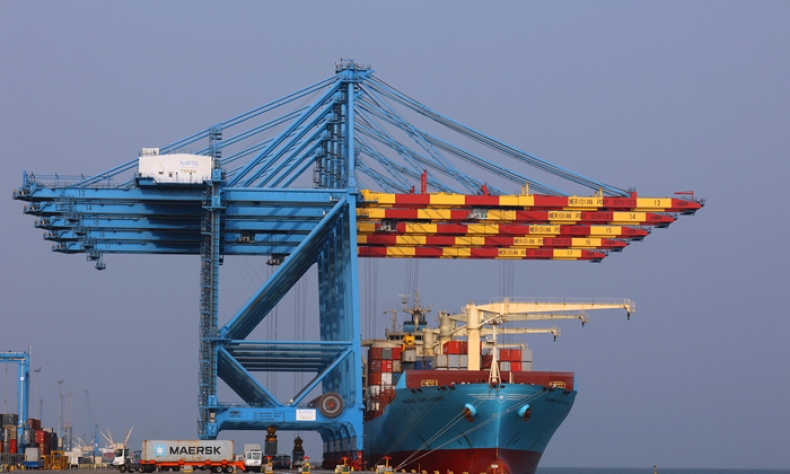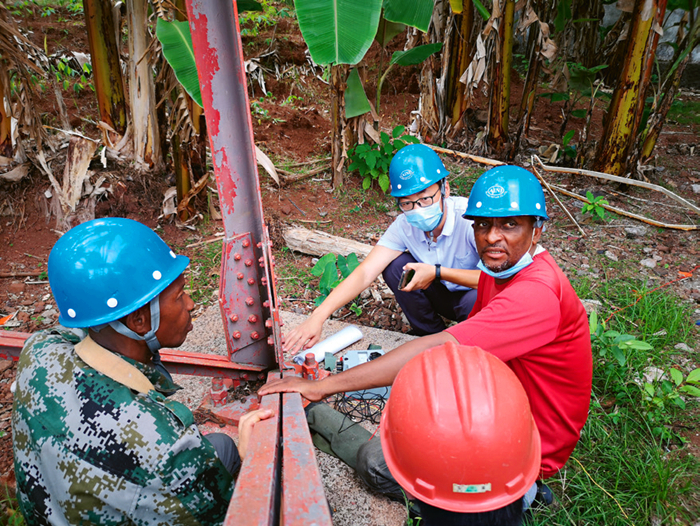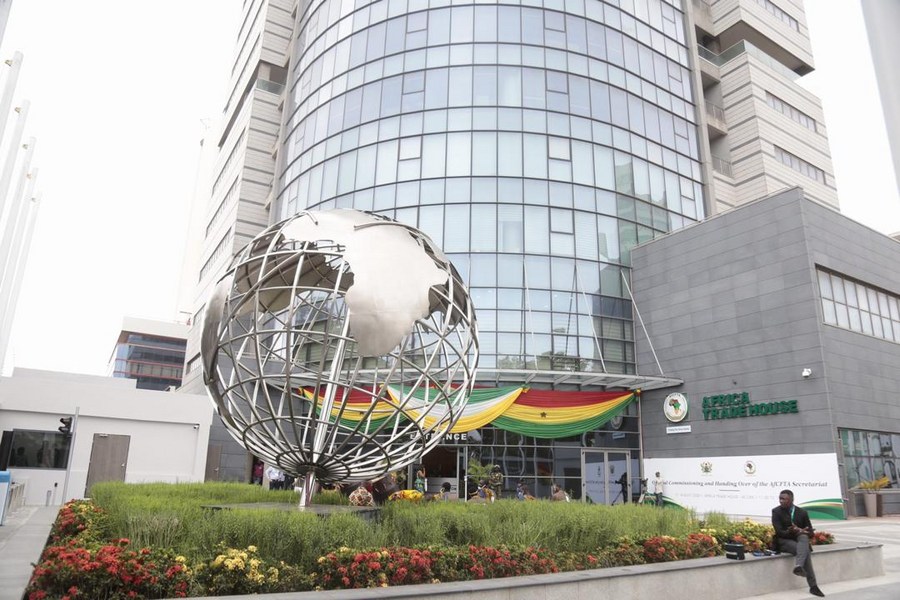Advancing Integrated Development

At present, China and Africa are striving to build a China-Africa community with a shared future in the new era to further strengthen China-Africa cooperation.
Over the past 20 years, the African Union (AU) has made great achievements in promoting African integration and maintaining peace and security in Africa. China advocates multilateralism and supports the democratization of international relations, so it has always attached importance to cooperation with the AU and regarded it as one of the important partners in building a China-Africa community with a shared future.
Strengthening connectivity
The Belt and Road Initiative (BRI) was proposed by Chinese President Xi Jinping in 2013 to chart out new fields for international cooperation. Five areas have been singled out to advance the initiative: policy coordination, infrastructure connectivity, unimpeded trade, financial integration, and people-to-people exchanges.
Africa is an important region for the joint construction of the BRI. With 52 African countries as well as the AU Commission having signed cooperation agreements under the initiative, Africa has become the region with the largest number of countries participating in the initiative.
The AU’s Agenda 2063 proposes a set of Seven Aspirations, which outline a grand blueprint for achieving African renaissance on the occasion of the 100th anniversary of the founding of the Organization of African Unity (OAU). The construction of an integrated high-speed railway network and the establishment of the African Continental Free Trade Area (AfCFTA) are the flagship projects of the first 10-year plan of the Agenda 2063.
The synergy between the BRI and the Agenda 2063 started in 2015. In January of that year, the Chinese Government and the AU Commission signed the Memorandum of Understanding (MoU) on the Promotion of China-Africa Cooperation in the Fields of Railway, Highway, Regional Aviation Networks and Industrialization. According to the MoU, China would strengthen cooperation with African countries in the construction of high-speed railways, highways, and regional aviation networks within the strategic framework of the Agenda 2063 with a view to promote connectivity and further the industrialization process in African countries.

In fact, China-Africa infrastructure cooperation can be traced back to the 1960s and 1970s, when China built the famous Tanzania-Zambia Railway despite its own economic difficulties. After entering the 21st century, facilitated by the Forum on China-Africa Cooperation (FOCAC) and the BRI, China-Africa infrastructure cooperation has entered a new stage and made new contributions to the connectivity of the continent.
In December 2020, the Chinese Government and the AU signed a cooperation plan on jointly promoting the building of the BRI. This is the first cooperation document signed by China and a regional organization to jointly build the BRI.
The plan significantly enhanced synergy between the BRI and the AU’s Agenda 2063, and added new impetus to common development. In December 2021, the two sides signed an MoU focused on the establishment of the initiative’s coordination mechanism, marking the institutionalization of the cooperation under the BRI.
In recent years, China and Africa have made new achievements in the field of infrastructure through the joint construction of the BRI. According to official data, since the founding of FOCAC in 2000, Chinese companies have helped Africa build and upgrade more than 10,000 km of railways, nearly 100,000 km of highways, some 1,000 bridges, 100 ports, and 66,000 km of power transmission lines.
In an interview with Xinhua News Agency, Erastus Mwencha, Former Deputy Chairperson of the AU Commission, said the BRI has been a game changer in Africa where it has spurred connectivity and seamless trade.
Support to African integration
Promoting Africa’s unity and economic integration has always been an important mission of the AU. The establishment of the AfCFTA is a vital starting point for African integration. In June 2015, AU member states launched negotiations on the AfCFTA. In March 2018, 44 African countries signed the AfCFTA agreement at an AU summit held in Kigali, the capital of Rwanda. On July 7, 2019, an extraordinary summit of the AU held in Niamey, the capital of Niger, officially announced the establishment of the AfCFTA, which was launched at an online ceremony in January 2021.
China firmly supports Africa’s pursuit of strength through unity and its integration process. In the Addis Ababa Action Plan (2004-06) adopted by the Second Ministerial Conference of FOCAC held in Addis Ababa in 2003, China made the commitment that, encouraged by the progress of the New Partnership for Africa’s Development implementation and African regional cooperation, it would support and assist African countries in realizing their objectives for peace and development of the continent. At the FOCAC Beijing Summit held in 2006, the Chinese Government decided to build a conference center for the AU to support African integration. The center was opened in 2012.

At the Fifth Ministerial Conference of FOCAC in 2012, the Chinese Government announced a series of measures to strengthen the pragmatic cooperation between China and the AU. At the 18th AU Summit held in Addis Ababa in January 29, 2012, China pledged to provide 600 million yuan ($89.1 million) in free assistance to the AU in the next three years, which reflects China’s firm support for African countries’ independent choice of development path.
At the FOCAC Johannesburg Summit held in 2015, China reiterated its support for African integration. China commended African countries in acting on Agenda 2063 and its first 10-year implementation plan, and pledged continued support to the AU in building a united, integrated and prosperous Africa.
China has supported the AfCFTA since its establishment. In the China-Africa Cooperation Vision 2035 adopted by the Eighth FOCAC Ministerial Conference in November 2021, China committed to actively participate in the development of the AfCFTA, as it will not only help promote intra-regional trade and African economic integration, but also help combine China’s development experience, technology and capital with Africa’s rich natural and human resources, injecting new vitality into China-Africa cooperation.
At present, China and Africa are striving to build a China-Africa community with a shared future in the new era to further strengthen China-Africa cooperation. The nine programs announced at the Eighth FOCAC Ministerial Conference identified the priority cooperation projects and objectives of the two sides in the next three years.
As Chinese President Xi Jinping pointed out in the message of congratulation to the 35th African Union Summit in February 2022, under new circumstances, China stands ready to work with the African side to actively implement the outcomes of FOCAC meetings, and dvance the in-depth synergy among Belt and Road cooperation, the Global Development Initiative, the AU’s Agenda 2063 and the building of the Free Trade Area, so s to bring China-Africa cooperation to a higher level with more extensive fields, and write a new chapter in China-Africa friendship.
The author is director of the African Studies Center at the Shanghai Normal University.
 Facebook
Facebook
 Twitter
Twitter
 Linkedin
Linkedin
 Google +
Google +










